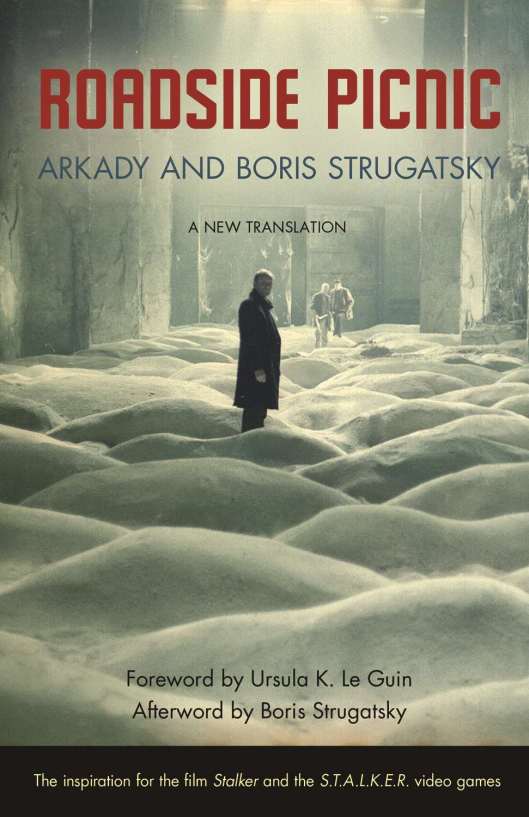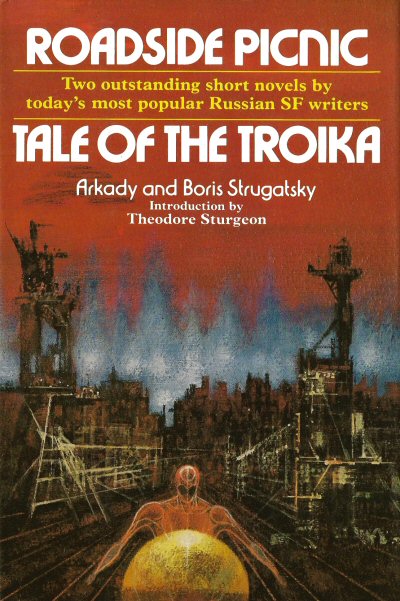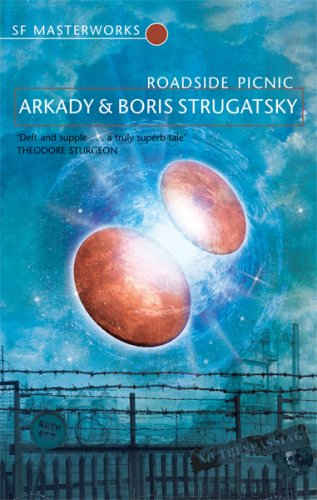Tags
1970s, 1972, Arkady Strugatsky, Boris Strugatsky, first contact, Gollancz SF Masterworks, John W. Campbell Award nominee, Olena Bormashenko, psychological, Richard Powers, Russian, science fiction, Soviet, Strugatsky brothers
A picnic. Picture a forest, a country road, a meadow. Cars drive off the country road into the meadow, a group of young people get out carrying bottles, baskets of food, transistor radios, and cameras. They light fires, pitch tents, turn on the music. In the morning they leave. The animals, birds, and insects that watched in horror through the long night creep out from their hiding places. And what do they see? Old spark plugs and old filters strewn around… Rags, burnt-out bulbs, and a monkey wrench left behind… And of course, the usual mess—apple cores, candy wrappers, charred remains of the campfire, cans, bottles, somebody’s handkerchief, somebody’s penknife, torn newspapers, coins, faded flowers picked in another meadow.
Soviet science fiction fascinates me. There was a lot of SF written in Eastern Europe—not a surprise, given the Soviet Union’s role in space exploration—but scant little of it made its way over the Iron Curtain. Aside from a handful of anthologies, Stanisław Lem and the Strugatsky brothers are the only names that resonate in American science-fiction histories. I’ve already dealt with Lem by reading his Solaris; conveniently enough Roadside Picnic, the masterpiece of Arkady and Boris Strugatsky, was reprinted with a new translation this year (by Olena Bormashenko). It’s been a long time coming: while Gollancz in the UK has printed it in the last few decades as part of their SF Masterworks series, the novel hasn’t been printed in the US for twenty years. It features a nice introduction by Ursula K. LeGuin, and an afterward by Boris Strugatsky on the hardships endured while attempting to publish the novel.
Roadside Picnic‘s cultural impact is one I’m already familiar with. Andrei Tarkovsky adapted the novel (loosely) into the 1979 film Stalker, a combination of brutal philosophical journey and lethargic black-and-white European arthaus. The novel’s “zones of alienation” were echoed by the 1986 Chernobyl explosion, which left a large exclusion zone around the reactor; some of the scientists left studying the zone, as well as guides who smuggle in tourists illegally, are said to call themselves “stalkers” in homage to the film. The book, film, and Chernobyl disaster have been very influential on the new wave of Russian video game designers, namely the teams behind the S.T.A.L.K.E.R. franchise and Metro 2033, replacing the alien visitors in Roadside Picnic with post-apocalyptic Chernobyl disaster trappings to explain the artefacts and anomalies. (Both series are great, atmospheric horror/shooters, but it’s clear how they stray from the novel.)

Chicago Review Press – 2012 – if you have to have a movie tie-in photo on your book, this is the way you do it. Great image.
They came thirteen years ago and went forty-eight hours later, leaving shattered landscapes and strange debris in their wake. Who they are, and their reason for stopping on Earth, remain unknown—as are the exact purpose and function of these artifacts. Human scientists are hard at work studying these valuables, and are even making remarkable scientific breakthroughs with these devices, but are left unsure that they’re using these miracle devices even remotely as intended—or, as LeGuin puts it in her introduction, if they’re using “Geiger counters as hand axes and electrical components as nose rings.” Some scientists believe that these are messages left by the aliens, perhaps a test for humanity to gauge its preparedness to enter the solar stage. Others believe this is just garbage from creatures so advanced that humans are insignificant animals cowering beneath them (see quote above).
While these six locations are now Zones of Alienation, guarded by military-police, a booming black-market subculture has grown around the young men calling themselves “stalkers” who sneak into the zones to recover these valuable alien artifacts. Braving the hazards of the Zone, many die short and nasty deaths trying to acquire artifacts. Others get tracked down by the police, while some others give up and move away to work in real jobs.
Red Schuhart is one of these stalkers; employed as an intern by the scientists studying the Zone, he’s trying to live on the border between legality and outlaw, using his expertise to guide the Russian scientist Kirill in and out of the Zone. On one of these excursions to collect a “full empty,” the worst possible result happens. The embittered Red keeps going back into the zone, addicted to its dangers and thrill, yet hateful of its attraction and the emotional toll associated from all the dead friends and compatriots left in the Zone’s anomalies. But Red will keep going back, because the Zone has what he needs: a limitless supply of valuable artifacts, including a golden sphere which will make wishes come true.

MacMillan – 1977 – Richard Powers. A beautiful dystopic background; even from the beginning the focus was on the golden wish granter.
Roadside Picnic is not what you might imagine when thinking of a first contact story; the contact isn’t between species, but between Red and the alien debris. This focus makes the story all the more human. On the one hand, we have the theme of humanity attempting to adopt these futuristic technologies, the human spirit to survive and better itself. On the other, we have the plight of the stalkers: bitter and poor young men who live in a lower-class ghetto beneath the shadow of the shiny scientific community. The scientists and the military have overtaken the city, and while those born there have various avenues of escape, most pursue the lure of the Zone and become stalkers. They’re not quite forced to go into the zone to survive, but do so in attempts to better their economic standing—part of the Strugatsky’s philosophical commentary, on capitalism and communism
Yet Red never manages that upward mobility; later in the story, he’s still living in a run-down Soviet-style tenement and struggling to provide for his family. The value of the artifacts is supposed to be high, but while all the stalkers dream of cashing in and moving to Europe, most of them seem to die in the Zone’s many hazards or emerge too broken to continue smuggling. A vicious cycle, veering towards post-colonial literature in its depiction of the impoverished lower-class doing dangerous things for a quick buck; it’s a refreshing brand of irony to see this applied to what’s ostensibly Canada (the prologue mentions the Royal Armored Corps blockading the Zone, and refers to “over in Europe,” but leaves the exact locale undefined). Also worth mentioning is how the novel falls into the ’70s brand of dystopia, when it was written by those living inside the same state those dystopias were condemning—there’s a loaded subtext when Russians are writing about a protagonist who rebels against the authorities, working against the community, etc.
What fascinates me about science fiction written on the other side of the Iron Curtain is its portrayal of aliens as the total other: aliens presented as, well, alien, totally foreign to any terrestrial thing we can compare to. Solaris is a good example of this, where Lem’s sentient alien planet utterly humbles humanity’s repeated attempts to contact and comprehend. As the other best-known Eastern European SF novel, Roadside Picnic is a similar send-up to the West’s alien stereotypes of the time, a bitter refutation and stunning contrast to the legions of bug-eyed monsters and super-smart humanoids. The artifacts’ purposes boggle human minds, leaving the artifacts and their creators shrouded in mystery. (And a bit of paranoid fear; people worry about the Zones expanding to encompass other areas, but no one mentions the underlying threat of the aliens’ return.)

Gollancz SF Masterworks #68 – 2007 – Dominic Harman. The Zone border and a brilliant blue cover scheme, along with the “full” empty.
Comparing Roadside Picnic to Western science fiction of the era makes it feel more realistic: the aliens are incomprehensible and unknowable… as they should be. (In fact, that they’re missing altogether was brave new territory for its time.) John Campbell once decreed that authors submitting to his Astounding write aliens who were “as smart as a man but who didn’t think like a man,” but subverted this by then requiring humanity to always persevere in the end—because of their adaptability and survival instincts and all that. Here, it’s clear that the aliens are thinking on scales so far ahead of mankind that humanity is only able to scratch the surface of their technology. Roadside Picnic also manages to undermine another of the stock tropes in Western science fiction, that of the heroic scientific protagonist: Red isn’t a scientist but just a working-class joe, with a wife and child to feed, adding to the layers of realism.
So, the world is fascinating and well developed, the focus centered and human, the prose bleak but rich. Red might not be the easiest for all readers to connect with—he swears a lot—but he’s lifelike and complex, and his development is what moves the book along. And it’s that combination of mind-blowing big idea and intimate snapshot of humanity that makes the book feel alive. Roadside Picnic is a luminant book, a beacon of intelligent science fiction that remains compelling and engaging forty years after publication. It’s easy to see why the Chicago Review Press reprinted it, and why high-brow literary press make mention of the title: it’s not just a strong work but a strong literary one.
When most people think “science fiction,” things like The Day The Earth Stood Still, Buck Rogers, and Starship Troopers come to mind. This is not that kind of science fiction. It punishes the lazy reader, demanding attention with an unrelenting stream of cerebral concepts designed to make you think. Heady and insightful, it’s also something of a condemnation of Western science fiction—or, if not a condemnation, a brutal and realistic contrast to generic mainstream science fiction.
If it’s not obvious already, when I mention the brilliance of a novel, it’s a big ole recommendation. The translation was amazing, the prose crisp and clean and readable… and readability doesn’t always go hand-in-hand with philosophical genius, as it does here. This was a book I couldn’t put down, and I enjoyed every minute I spent engrossed in its pages. I wish someone would re-translate and re-publish more Eastern European SF—or at least more Strugatsky novels—because I’m enthralled with them after finishing Roadside Picnic.

Powers’ cover…. swoon…
LikeLike
Interesting stuff!
And the Powers cover is definitely better than the one on my Pocket Books copy, which also includes The Tale of the Troika, curiously enough.
I find the quality of the Strugatsky’s work (as read in English) a bit variable – I failed to finish Noon: 22nd Century (or maybe I skimmed it and have since forgotten all the 2nd half of it!) – but quite possibly this is down to whoever was translating them. Hard to be a God was likewise a bit turgid in style, imho.
I have read different translations of some of their work, which was interesting; now I have to decide if I want to buy another edition of this one and see if I like it even more than before!
As a minor, but not conclusive test, how’s the final declaration at the end translated?
In my copy it’s
Damn it all, I can’t think of anything, except those words of his…’HAPPINESS FOR EVERYBODY, FREE, AND NO ONE WILL GO AWAY UNSATISFIED’!”
LikeLike
It could very well be the translation — I thought it was surprisingly fluid and dynamic.
The book ends with: “The hell with it all, I just can’t think of a thing other than those words of his—HAPPINESS, FREE, FOR EVERYONE, AND LET NO ONE BE FORGOTTEN!”
LikeLike
Sorry; thought I was logged in!
LikeLike
Also — forgot to mention it in the review, but each of the book’s sections changes point of view just a tad, I think to echo Red’s development. Do you remember if the original translation had that? Or the lots of cussin’ in the first section (Red’s point of view one)?
LikeLike
The changes in the PoV are there but a quick check doesn’t show much swearing; there’s only one swear word that I noticed on a brief 5 minute check. Sound like it may have been toned down in the 1977 translation. (You’ve put up what must be the hardback cover, my link is to the 1978 paperback of it)
If I thought I’d re-read it any time soon, I think I’d definitely get this new edition…
LikeLike
I give it two thumbs up; it was much better than most translations I’ve read. Something I’ve noted with modern translations; the older ones tend to be either too workmanlike or too literal.
LikeLike
So they’re slamming a wonderful Powers’ cover over at Good Show Sir (the one for Constigan’s Needle). I LOVE his 50s covers — slightly less avant-garde.
http://www.goodshowsir.co.uk/
Made me angry.
LikeLike
NOT a good show, sir!
Totally upvoted (downvoted?) that one.
LikeLike
I know! I desperately want a copy and want to review that Sohl volume!
LikeLike
Sadly, Boris has just died. Arkadi died some years ago.
LikeLike